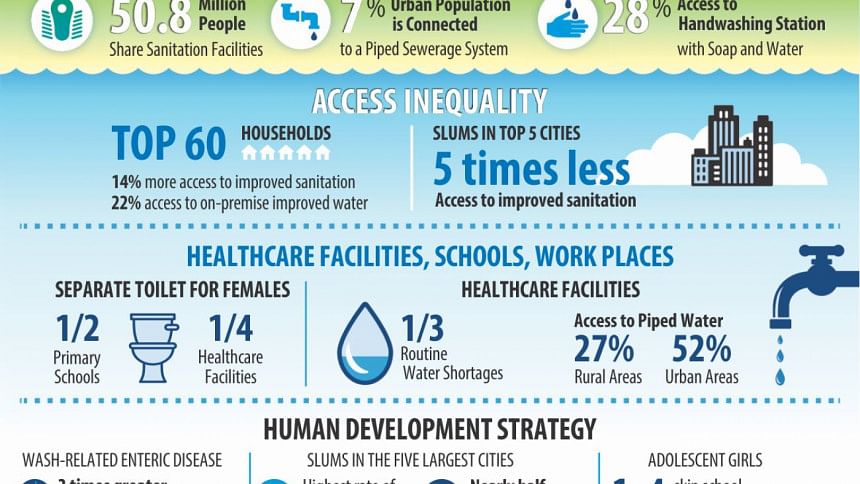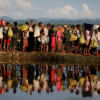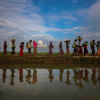Half of country's 'safe' water supply contaminated

Nearly half of the country's “safe” water -- supplied from technologically-improved sources -- is contaminated with E. coli bacteria, which is responsible for various intestinal diseases, revealed a World Bank report released in the capital yesterday.
Despite the country's remarkable progress in access to water and sanitation, 41 percent of all improved water sources are contaminated with E. Coli bacteria, the report cited, suggesting a high prevalence of fecal contamination in water.
Today, 98 percent of Bangladesh's population has access to water from technologically-improved sources, but E. coli contamination was found present in 80 percent of household tap-water across the country, it said.
E. coli (Escherichia coli) is a bacteria commonly blamed for causing diarrhea. Some forms of E. coli are also responsible for food poisoning, pneumonia, breathing problems, and urinary tract infections.
Bangladesh can reduce poverty and accelerate growth faster by taking urgent action to improve the quality of water and sanitation, said the report, “Promising Progress: A Diagnostic of Water Supply, Sanitation, Hygiene, and Poverty in Bangladesh” that the World Bank released in a programme at a city hotel.
It found that poor quality of drinking water affects the rich and poor, rural and urban population alike, but the poorest section of the population suffers three times more from water and sanitation related gastro-intestinal diseases.
Though Bangladesh has successfully eliminated the practice of open defecation, about 50 million people use shared, rudimentary toilets, and only 28 percent of toilets are equipped with soap and water, the report pointed out. In urban areas, slums have poor access to clean water and safe sanitation.
“Poor water quality and sanitation can hold back a country's potential because unsafe water and poor sanitation are linked to nutritional disadvantages in early childhood,” said Sereen Juma, World Bank acting country director.
“In Bangladesh, more than one-third of children under [the age of] five are stunted, limiting their ability to grow and learn,” he said. “Bangladesh has made great strides in expanding access to water and can build on that progress by focusing on improving the quality of water and sanitation.”
“Only about half of manufacturing enterprises in Bangladesh have toilets. Only half of the primary schools have separate toilets for girls, and one in four adolescent girls miss school during menstruation,” said George Joseph, World Bank senior economist and co-author of the report.
A safe water and sanitation environment would encourage more women to participate in the workforce, he said, adding that there is scope for Bangladesh to improve access to sanitation beyond the household level to public places, schools, health facilities, and workplaces.
Speaking as chief guest, Md Nazrul Islam, state minister for water resources, said the government is working on improvement of water and sanitation, and the report's findings would be helpful for further work.
This report is a part of the World Bank's WASH Poverty Diagnostics initiative in 18 countries, including Bangladesh.
Khairul Islam, country director of WaterAid, and Dr Hossain Zillur Rahman, executive chairman of Power and Participation Research Centre spoke, among others.
TurnitIndia Education Pvt Ltd Regional Director (South Asia) Ashim Sachdeva said policing faults should not be the sole priority, and parents should get involved in their children's activities to instill values.

 For all latest news, follow The Daily Star's Google News channel.
For all latest news, follow The Daily Star's Google News channel. 








Comments